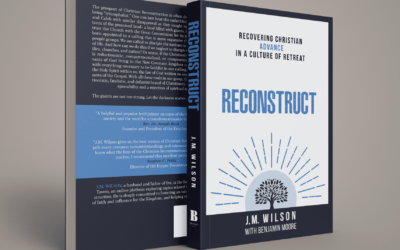“He has delivered us from the domain of darkness and transferred us to the kingdom of his beloved Son.”
Colossians 1:13
“But if it is by the Spirit of God that I cast out demons, then the kingdom of God has come upon you. Or how can someone enter a strong man’s house and plunder his goods, unless he first binds the strong man? Then indeed he may plunder his house. “
Matthew 12:28-29
“The reason the Son of God appeared was to destroy the works of the devil.”
1st John 3:8b
“For in him all the fullness of God was pleased to dwell, and through him to reconcile to himself all things, whether on earth or in heaven, making peace by the blood of his cross.”
Colossians 1:19-20
The debate within the church over the nature of Christ’s kingdom and how it interacts with politics and culture is raging. People everywhere are becoming more and more self-conscious about the foundations of their beliefs about religion, government, and culture. Secular humanism. Radical Islam. Vaccines. Presidential elections. Christian education vs. Secular education. Abortion. Socialism. Gay marriage. Every issue Christians will encounter is informed by their perspective on the Kingdom of Christ.
And yet when it comes to these issues, Christians, and sometimes more so, their pastors, are often confused, paralyzed and hesitant. They are asking themselves, what is God doing in the world? How should we then live and why? What is the Kingdom of Christ and how does it intersect with these issues? Does it intersect at all? What is the extent of the purpose of the Great Commission? Does it relate to political and cultural issues at all? What does it mean to “disciple the nations”? Aren’t all these institutions just going to burn up? If so, to what extent if any should the Christian be concerned about them? What does it mean for a Christian living in a fallen world to be a faithful citizen of the Kingdom?
Enduring or Transforming?
Whether they are conscious about it or not, Christians do tend to have a view (at least in practice) about how the Kingdom relates to the cultural institutions of the world. There are exceptions and nuances to be sure, but these views usually manifest themselves in one of the following two perspectives:
The Enduring View
A view of Kingdom theology that believes that the Church as the “redemptive kingdom” is to exist alongside cultural institutions (government, media, business, education etc.) or the “common kingdom.” This view holds that although individual Christians may participate in these “common kingdom” institutions, the mission of the church excludes the transformation of these institutions into distinctly “Christian” institutions. This view would consider the “Christianization” of civil government as either not possible, an unhelpful distraction, or even a negative outcome prior to Christ’s return. [1] [2]
The Transforming View
A view of Kingdom theology that believes that the Church will do more than endure, and has as part of its mission, the ultimate transformation of all things, not excluding the cultural institutions of the world.[3] Although it affirms that institutions like the civil government and the church are separate according to their roles and jurisdictions, this view takes a positive view of the concept of “Christendom” where biblical principles are applied to all areas of life including civil government. It affirms that institutions like the family and civil government should not be left untransformed by the mission, influence, and activities of the church.
In this chapter, I will argue in favor of the second view which I refer to as the “transforming kingdom” view and against the first view which I refer to as the “enduring kingdom” view. Is the church mainly meant to endure till Christ’s return or is it meant to also transform earthly culture and institutions?
The Mediatorial Reign of ChristTo understand the “transforming kingdom” view we must first understand the mediatorial reign of Christ. It is evident that the Triune God rules over all things at all times, during both the Old Testament and New Testament times. That being said, there is a sense in which Christ did not begin his “mediatorial reign” over the nations as King until he sat down at the right hand of the Father at his ascension. Notice this prophetic passage from Daniel Chapter 7 where Daniel sees a futuristic vision of the ascended Christ where He is given a kingdom which is marked by obedience (it is transformed) over all nations.
“I saw in the night visions, and behold, with the clouds of heaven there came one like a son of man, and he came to the Ancient of Days and was presented before him. And to him was given dominion and glory and a kingdom, that all peoples, nations, and languages should serve him; his dominion is an everlasting dominion, which shall not pass away, and his kingdom one that shall not be destroyed.”
Daniel 7:13-14
We see this echoed again in prophetic passages Psalm 2 and Psalm 110:1, where Jesus is promised that he will one day receive the nations as his inheritance and that he will be seated as King over all nations at the right hand of the Father:
“As for me, I have set my King on Zion, my holy hill. I will tell of the decree: The Lord said to me, “You are my Son; today I have begotten you. Ask of me, and I will make the nations your heritage, and the ends of the earth your possession.”
Psalm 2:7-8
“The Lord says to my Lord: “Sit at my right hand, until I make your enemies your footstool.” The Lord sends forth from Zion your mighty scepter. Rule in the midst of your enemies!”
Psalm 110:1-2
Note how in this Kingdom, Christ rules “in the midst” of his enemies. Meaning, this is not the kingdom of the eternal state where all the wicked have been thrown in the lake of fire. This is the period of time leading up to the return of Christ and final judgement where His enemies are being footstooled in history.
If you haven’t pondered the reality of Christ’s mediatorial reign, think about how He responds to Satan when being tempted in the wilderness. Apparently, prior to Christ’s ascension, there was some subordinate sense in which Satan had power and control over the nations, and Jesus did not. Christ declines Satan’s offer to receive the kingdoms from him, for to accept it from Satan would have been to acknowledge Satan as one who has power and authority to grant ownership over the nations, this is power that only the Father possesses. Jesus knew He was to receive authority over the nations from God the Father at the proper time, and not as a gift from Satan.
And the devil took him up and showed him all the kingdoms of the world in a moment of time, and said to him, “To you I will give all this authority and their glory, for it has been delivered to me, and I give it to whom I will. If you, then, will worship me, it will all be yours.” And Jesus answered him, “It is written, “‘You shall worship the Lord your God, and him only shall you serve.’”
Luke 4:5-7
After Christ’s ascension we, see that this rightful authority over the nations now belongs to Christ. Evidently, the Son did not forget to ask the Father for the nations as His inheritance (Psalm 2:7-8).
And Jesus came and said to them, “All authority in heaven and on earth has been given to me. Go therefore and make disciples of all nations, baptizing them in the name of the Father and of the Son and of the Holy Spirit, teaching them to observe all that I have commanded you…”
Matthew 28:18-20
There was still some sense in which Satan was the “god of this age” (2nd Corinthians 4:4) but Satan was now bound with respect to his ability to deceive whole nations (Revelation 20:2). Now Satan’s illegitimate kingdom was going to begin to be ransacked by the kingdom of the rightful Lord and Messiah, Jesus.
“But if it is by the Spirit of God that I cast out demons, then the kingdom of God has come upon you. Or how can someone enter a strong man’s house and plunder his goods, unless he first binds the strong man? Then indeed he may plunder his house. “
Matthew 12:28-29
Further, in the books of Acts we see the Apostles proclaiming this amazing reality of Christ’s enthronement at the right hand of the Father. They quote directly from Psalm 110:1 as they celebrated the present reality of Christ’s reign.
“This Jesus God raised up, and of that we all are witnesses. Being therefore exalted at the right hand of God, and having received from the Father the promise of the Holy Spirit, he has poured out this that you yourselves are seeing and hearing. For David did not ascend into the heavens, but he himself says, “The Lord said to my Lord, “Sit at my right hand, until I make your enemies your footstool.”’ Let all the house of Israel therefore know for certain that God has made him both Lord and Christ, this Jesus whom you crucified.”
Acts 2:32-34
We also see this “enthronement” reality affirmed in the Apostle Paul’s letter to the Ephesians:
“…that he worked in Christ when he raised him from the dead and seated him at his right hand in the heavenly places, far above all rule and authority and power and dominion, and above every name that is named, not only in this age but also in the one to come.”
Ephesians 1:20-21
Not only do we see that the reign of Christ begins at his ascension, we also see the nature of his mediatorial reign is one that has a fundamental purpose. The purpose of his reign is to secure the obedience of the nations, in other words, to “footstool” them.
“But when Christ had offered for all time a single sacrifice for sins, he sat down at the right hand of God, waiting from that time until his enemies should be made a footstool for his feet.”
Hebrews 10:12-13
“Then comes the end, when he delivers the kingdom to God the Father after destroying every rule and every authority and power. For he must reign until he has put all his enemies under his feet. The last enemy to be destroyed is death.”
1st Corinthians 15:24-26
This promise that the reign of Christ would secure the obedience of the nations was foretold way back in Genesis:
“The scepter shall not depart from Judah, nor the ruler’s staff from between his feet, until tribute comes to him; and to him shall be the obedience of the peoples.”
Genesis 49:10
The expansiveness of Christ’s reign and the character of His rule that we see expressed in scripture is such that it makes the notion that the earthly institutions are not to be transformed by it seem extremely far-fetched. It is true that beyond sporadic or inconsistent instances, we do not yet see these institutions currently obeying Him in how they operate, and yet that is indicative of the task before us and not evidence that this is how it is supposed to be It is amazing that we have seen so much transformation in the world when the church has regularly operated with the mindset that earthly institutions are not meant to be transformed. Is it any wonder that there is still such a great task before us?
The Kingdom of Satan vs. The Kingdom of Christ
From the very beginning in the Garden Eden, we see that the fundamental antithesis of history is the battle between the seed of the serpent (Satan) and the seed of the woman (Christ), a battle between two kingdoms, one good, and one evil.
“I will put enmity between you and the woman, and between your offspring and her offspring; he shall bruise your head, and you shall bruise his heel.”
Genesis 3:15
Beyond this we see that when a Christian is saved, they aren’t transferred into a multiple Kingdoms of Christ, they are transferred into a single Kingdom.
“He has delivered us from the domain of darkness and transferred us to the kingdom of his beloved Son”
Colossians 1:13
While we can agree that God has authorized various forms of human government under his authority (civil government, church government, family government) none of these fall outside of the authority of Christ’s kingdom. Those within these governments may not obey Him currently, but this does not lessen their obligation to do. In light of this reality, it does not appear to be helpful to declare that there are multiple “kingdoms” of God, especially in our contemporary understanding of what a “kingdom” is. The only two kingdoms we see described in scripture are the kingdom of Christ and the kingdom of Satan – and they are at war.
Future Things
An important aspect of “enduring kingdom” theology which I believe is unbiblical (or at the very least puts the cart before the horse) is that it smuggles in a pessimistic, under-realized view of the future, and a reductionistic view of the Great Commission, and the Gospel. The “enduring kingdom” perspective says definitively that cultural and civil institutions will not be redeemed prior to Christ’s return. [4] For them, there is no way to “Christianize” government, art, business, or economics. In this perspective, the concept of “Christendom” is not an end of the Great Commission but an obstacle to its success as Christians can become “distracted” from the main goal of converting souls.
Any significant attempt by the church to transform these institutions would be labeled an unhealthy distraction. They confuse Christ’s declaration that his kingdom is not of this world as a declaration that his kingdom is not in the world. It’s not so much that they deny that civil institutions would be in better shape if they were full of Christians, it’s that they don’t think of cultural institutions as something that even needs redemption, because in their mind, that’s for later when Christ returns in the consummated New Heavens and New Earth. Without this pessimistic eschatology, their system makes little sense, so they must continue its emphasis.
This is not to say they explicitly teach that Christians should avoid involvement with any cultural institution (though often this is the implicit teaching). If a Christian does decide to vocationally take up a career in politics, the enduring kingdom adherent wouldn’t stop them or might even encourage and support them. But they would be reminded that in doing the work of a politician they are not contributing to God’s redemptive plan, (unless while at their job, they share the message of the death, burial and resurrection with a co-worker and the co-worker is born again). Bringing the behaviors of the people in these institutions towards obedience to Christ in how they operate is not seen as part of the transforming mission of the great commission.
The enduring kingdom view also holds that the church should generally not speak on specific “political” issues. So not only do they exclude working to redeem civil government or any institution deemed to be part of the “common kingdom” from the work of the Great Commission, but they rarely (if ever) allow the church to speak to any “political” issue at all. For the enduring kingdom adherent, this would constitute a confusion of kingdoms. The only goal in this perspective is to preserve a political climate which is conducive for the church to be able to pursue their reductionistic view of the Great Commission. Is it any wonder we see much of the culture in the Christian west going to hell in a handbasket?
Christ’s Kingdom – Footstooling the Nations
From the beginning, we see that God created the family and man’s rule and dominion over creation (Genesis 2:15-24)). So with Christ being the second Adam (1st Corinthians 15:22), it should be noted that we are not saved from hell just to be transported to a cloudy heavenly existence where we play harps for all eternity. We are saved for a purpose. By the work of the Holy Spirit in our lives, we are being restored to faithful servants of God in the kingdom of God as we fulfill His purposes for us on the earth.
“For we are his workmanship, created in Christ Jesus for good works, which God prepared beforehand, that we should walk in them.”
Ephesians 2:10
“…our great God and Savior Jesus Christ, who gave himself for us to redeem us from all lawlessness and to purify for himself a people for his own possession who are zealous for good works.”
Titus 2:13b-14
“And I will give you a new heart and a new spirit I will put within you. And I will remove the heart of stone from your flesh and give you a heart of flesh. And I will put my Spirit within you and cause you to walk in my statutes and be careful to obey my rules.”
Ezekiel 36:26-27
God’s plan of redemption is not only about redeeming souls to avoid hell. He is redeeming everything that was corrupted. He is destroying the works of Satan. He is doing it through the work of the Holy Spirit, in his dwelling place, the church. This happens progressively throughout history and then fully and finally at the consummation when death and sin is finally defeated. This age is not an age of wandering in the wilderness as the unfaithful generation of Israel was forced to do. To the contrary, the nations are being footstooled prior to Christ’s return. This is the part that the adherents of the enduring kingdom reject. If you espouse any notion of the great commission including the work of redeemed saints transforming society as part of the great commission, you will be accused on “imminatizing the eschaton” (putting the cart before the horse). What they miss is that this redemption of the whole world through the discipling of the nations is what the great commission produces! They have a horse but it’s not pulling a cart.
We would agree with enduring kingdom advocates that institutions which are full of unredeemed people cannot be redeemed by force. But part of what happens in the process of the discipling of the nations is that all these institutions are changed from opposing Christ and his Kingdom to obeying him as the people within these institutions are regenerated.
That’s why as a function of Christ inheriting the nations, we not only see individuals commanded to live in Holiness, but nations, Kings and Rulers being commanded to obey the Son (Psalm 2). Christ has one kingdom and one people and total authority over everything in his Kingdom (which is everything on heaven and on earth). It’s a Heavenly Kingdom, not an earthly one, but the Heavenly Kingdom’s rule doesn’t stop at the pearly gates.
Now, as we stated earlier, does Christ have different spheres of authority and rules set up within his one kingdom? Of course. There is self-government, family government, church government and civil government. Each of these has its own jurisdiction. The church cannot punish evil doers with the sword, and the state cannot excommunicate from the church. But all these spheres of authority exist within the single Kingdom of Christ.
A Reductionistic Gospel & Reductionistic Great Commission
The enduring kingdom view also smuggles in a reductionistic view of the Gospel and so by extension they have a reductionistic view of the Great Commission. They say the church needs to “just preach the gospel.” But they limit the meaning of “the gospel” to the death, burial and resurrection of Christ and the associated forgiveness of sins Christ offers. As discussed in a previous chapter, when they seek to buttress their arguments for limiting the Gospel to “Christ crucified,” they treat the word “Christ” as if it is a surname rather than a royal title which has imbedded within it a royal decree. If they include any talk of kingdom at all in their gospel message it’s only about a future kingdom which isn’t on the earth now, except “spiritually” in the gathered church as they seek to administer the sacraments and practice church discipline. This reductionism is all very foreign to scripture.
As we have seen earlier in the chapter, the ‘Good News” in scripture is not only centered around the atonement but is also centered around the coming of the Messiah and His Kingdom. Notice how the Gospel is presented by the prophet Jeremiah. There is both a focus on the reign of the King, and the imputed righteousness His atonement brings.
“Behold, the days are coming, declares the Lord, when I will raise up for David a righteous Branch, and he shall reign as king and deal wisely, and shall execute justice and righteousness in the land. In his days Judah will be saved, and Israel will dwell securely. And this is the name by which he will be called: ‘The Lord is our righteousness.’
Jeremiah 23:5
While Isaiah 53 focuses on the atonement of the Messiah, in Isaiah 9, the prophet focuses on the Kingdom aspects of the Gospel:
For to us a child is born, to us a son is given; and the government shall be upon his shoulder, and his name shall be called Wonderful Counselor, Mighty God, Everlasting Father, Prince of Peace. Of the increase of his government and of peace there will be no end, on the throne of David and over his kingdom, to establish it and to uphold it with justice and with righteousness from this time forth and forevermore.
Isaiah 9:6-7
And how expansive is this Kingdom? In scripture, this kingdom of Christ is not limited to a Sunday worship service. It is Christ’s authority over everything in heaven and on earth including rulers and kings. As theologian and statesman Abraham Kuyper said in his inaugural address, “There is not a square inch in the whole domain of our human existence over which Christ, who is sovereign over all, does not cry: ‘Mine!’”. This authority that Christ now wields is very, very good news. In fact, that Christ has inherited the nations is no less a precious aspect of the gospel than the fact that Christ is savior of your soul. We see so clearly the political implications of this heavenly kingdom on the earth which was “turning the world upside down” in the book of Acts.
Christ’s kingdom is one that scatters the darkness wherever it lies. We don’t see darkness becoming light, but we do see darkness being defeated resulting ultimately in a redeemed earth with all of its institutions under Christ’s feet. The scripture teaches that as part of the great commission we (the people of God) are to disciple the nations teaching them to obey all the Christ commanded. And “all that Christ commands” effects every human person in every vocation that they have. So we as the church cannot obey the great commission if we are not teaching them how to obey Christ in their different spheres, or if we are muzzling the church in speaking against issues that may be deemed “political.” “All that Christ commands” includes the command to proclaim the gospel. A fully orbed gospel presentation includes the notion that the Messiah has come in Christ, and that he has inherited the nations and received all authority in heaven and on earth.
Christian Governments and Christian Salads
In an attempt to persuade Christians to their position, enduring kingdom adherents will sometimes employ a reductio ad absurdum tactic that says something along the lines of “The church shouldn’t be proclaiming about whether to make a salad with croutons or without croutons, or about what kind of trade agreements governments can make with each other, or whether to vote for political candidate A or B”.
But this approach is a distraction from the real issue and a smokescreen. The point is that principles from Scripture are to be brought to bear on the political realm and the issues we face today. Although the question seems absurd on the face of it, in one sense, the answer is yes, you can make a salad in a Christ-honoring way or in a Christ-dishonoring way. Don’t poison the salad. The response no doubt would be to point out that unbelievers don’t usually poison salads. Of course they don’t, and when they don’t, they act like a Christian, even if they reject the source of all morality. You see, we mustn’t speak as if God isn’t the owner of morality. There is no neutrality.
On the issue of abortion, enduring kingdom adherents might say that the church can declare it is wrong, but they typically would not make specific pronouncements on what the government (or individuals in government) should do or call out specific rulers for rebellion against Christ.
The notion of the separation between Church and state doesn’t mean the Church doesn’t call the civil realm to obey Christ. It means the Church has no responsibility to carry out the obligations of the state. The enduring kingdom view is a reactionary, unbiblical teaching that has borne the fruit of producing large scale escapism by the church in the cultural institutions of the world. In the same way that defeatist eschatology has produced an excuse to check out of society, enduring kingdom ecclesiology provides a way out of applying the great commission to the work of transforming the institutions around us. I do not assign conscious bad intent, but it seems undeniable that this is the clear effect this perspective has had.
It may be that the enduring kingdom mentality has arisen as a reactionary pendulum shift as a result of some of the excesses of the distant pass. There were eras in which the church overstepped its bounds and acted as the civil magistrate (and vice versa). This was done under the name of “Christianity” but to the extent these instances were out of accordance with biblical law they were truly a departure from the biblical-law accordant Christendom we are calling for. This resulting “enduring kingdom” pendulum swing against these distortions is understandable since we have seen big-government welfare, Orwellian micromanagement of society, and quasi-communist states all be pushed under the banner of “Christianity” and “Christendom.” That said, as stated earlier, we must not use this as an excuse to throw out the concept of Christendom altogether. What we need is Christendom combined with a commitment to the bounds of God’s law.
While enduring kingdom theologians throw out Christendom, competing religions of secular humanism and Islam have no such divide in their worldview and with the rise of the enduring kingdom mindset we have seen Christendom in society (however flawed it has been) replaced by systems of humanistic and pagan culture and law. This is not a good thing for society or for the propagation of the gospel. May the church be edified in her understanding of Christ’s transformative, conquering kingdom.
And so we pray:
“Our Father which art in heaven, Hallowed be thy name. Thy kingdom come, Thy will be done in earth, as it is in heaven.”
[1] The first view is consistent with a Lutheran influenced perspective on the kingdoms, more recently commonly referred to as the “Radical Two Kingdoms” view by its detractors. This view has been more recently popularized by theologians like Michael Horton and David Van Drunen etc. who see two kingdoms that exist under God, the “Common Kingdom” and the “Redemptive Kingdom.” They see the “common kingdom” (which includes civil government) as not needing to be transformed by the “redemptive kingdom.”
[2] “God is not redeeming the cultural activities and institutions of this world….” VanDrunen, David. Living in God’s Two Kingdoms: A Biblical Vision for Christianity and Culture. Grand Rapids, MI: Crossway, 2010.
[3] This second view is consistent with two schools of theology. The historical two kingdoms view of the Westminster Divines held by early Presbyterians who saw two kingdoms that were both to be ideally distinctly Christian (The Kingdom of Power and the Kingdom of Grace). Unlike modern two kingdoms theologians, they had no problem with the concept of Christendom or a Christian civil government. The 2nd school would be the Kuyperian one kingdom view held by many in the continental reformed community who saw one Kingdom of God opposed to the Kingdom Satan. For practical purposes these are mainly semantical differences. Both schools affirm that civil government and the church were separate entities with separate roles and jurisdictions. Both affirm that these institutions should be transformed to be explicitly Christian.
[4] “The earthly city will never be transformed into the city of God this side of Christ’s return in glory.” – Michael Horton “A Tale of Two Kingdoms,” Ligonier Ministries





0 Comments